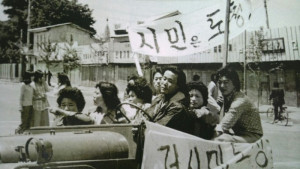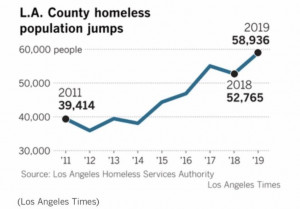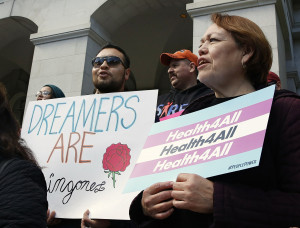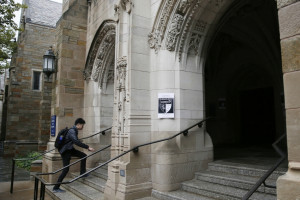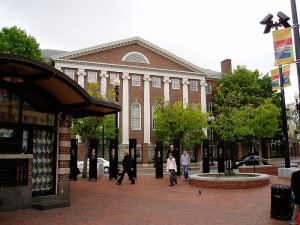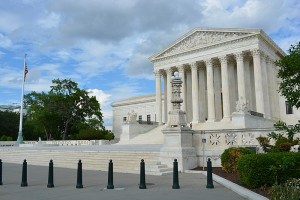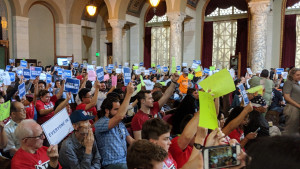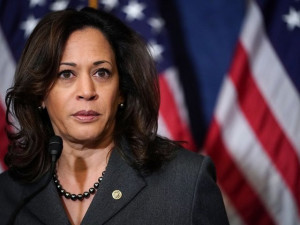Myung-Sook Cha, at age 19, was one of the young people who joined the May 1980 GwangJu Democratization Movement in South Korea. She was eventually captured by the military police, charged of being a North Korean spy, tortured and imprisoned for two years. She was subsequently exonerated and, after years of silence, decided to tell her story at events in Korea and among Korean diaspora communities to raise awareness about what happened at Gwangju and its role in the broader struggle for democracy in South Korea. She joined Jerome to talk about her role in the Gwangju movement, with executive director of the HANA Center Inhe Choi translating.
Media Coverage
In a hard reality check for Los Angeles County’s multibillion-dollar hope of ending homelessness, officials reported Tuesday that the number of people living on the streets, in vehicles and in shelters increased by about 12% over last year. The annual point-in-time count, delivered to the Board of Supervisors, put the number of homeless people just shy of 59,000 countywide. Within the city of Los Angeles, the number soared to more than 36,000, a 16% increase.
“She never had a chance to fight cancer.” Stories like that have prompted California lawmakers to consider proposals that would make the state the first in the nation to offer government-funded health care to adult immigrants living in the country without immigration status. Serrano was one of hundreds of immigrant activists who came to the Capitol on Monday for “Immigrant Day of Action.” She and her husband spent the day meeting with lawmakers, sharing the story of Angeles. “The conversation that I have is about the cost,” she said, describing her interactions with lawmakers. “The conversation we want to have is about our families.”
A crowd of around 70 protesters gathered in front of Asian Garden Mall in Westminster on Saturday morning to rally for refugees. President Donald Trump recently announced plans to deport Vietnamese refugees with any trace of a criminal record–something that didn’t sit well in Little Saigon. The United States Department of Homeland Security (DHS) released a statement saying, in part, that “these are non-citizens who during previous administrations were arrested, convicted, and ultimately ordered removed by a federal immigration judge,” in claiming deporting such refugees back to Vietnam is a priority.
Last week the Department of Justice, joined by the Department of Education, opened a new front in the fight over affirmative action, announcing an investigation into whether Yale discriminates illegally against Asian-American applicants. The move represents the latest attempt by the Trump administration to take aim at the longstanding practice of allowing race to be used as one of many factors, and never the primary or sole factor, in admissions at highly selective colleges and universities.
The affirmative action debate is shifting again, with new faces but old arguments. The claim? Affirmative action in college admissions hurts Asian Americans, especially at elite universities like Harvard. The story is not as simple as some commentators suggest. If admissions officers exhibited unconscious or conscious bias against Asian Americans, then this must be addressed. But even so, it is important to recognize that the problem would be racism, not affirmative action. To conflate the two represents a fundamental misunderstanding of the issues. It is also part of a pattern: Over the past few decades, challenges to anti-Asian bias have repeatedly been appropriated and reframed by opponents of affirmative action.
A federal judge on Thursday rejected the bulk of a Trump administration demand to block three California sanctuary laws, allowing the state to keep in place its most significant legislative measures aimed at countering President Donald Trump’s crackdown on illegal immigration. Sacramento-based U.S. District Court Judge John Mendez rejected, for now, the Justice Department’s drive to halt a California law that limits the kinds of immigration-related information state and local law enforcement can share with federal officials. The judge also declined DOJ’s request to block another law guaranteeing California officials certain information about local and privately run jails that hold immigration detainees in the Golden State.
At a heated meeting at City Hall, Los Angeles lawmakers pressed forward Friday with a plan to set up emergency shelters for homeless people across the city, voting unanimously to start assessing possible sites in Koreatown, Venice, Hollywood, Harvard Heights and the Westside.
U.S. Sen. Kamala Harris was in San Diego County Friday to visit an immigration facility in Otay Mesa. As part of her tour of the Otay Mesa Immigration and Detention Facility, Harris met with migrant mothers who have been separated from their children, according to officials with her office. After the tour, Harris and the ACLU of San Diego and Imperial Counties held a rally outside the detention facility. The event kicks off a weekend of regional demonstrations.
Atty. Gen. Jeff Sessions has ordered immigration judges to stop granting asylum to most victims of domestic abuse and gang violence, a move that would block tens of thousands of people, especially women, from seeking refuge in America. The attorney general’s decision forms a key part of a broader Trump administration effort to restrict immigration and discourage asylum seekers from coming to the U.S. The administration has also stripped various legal rights from detainees, and has been separating families detained by immigration agents.

